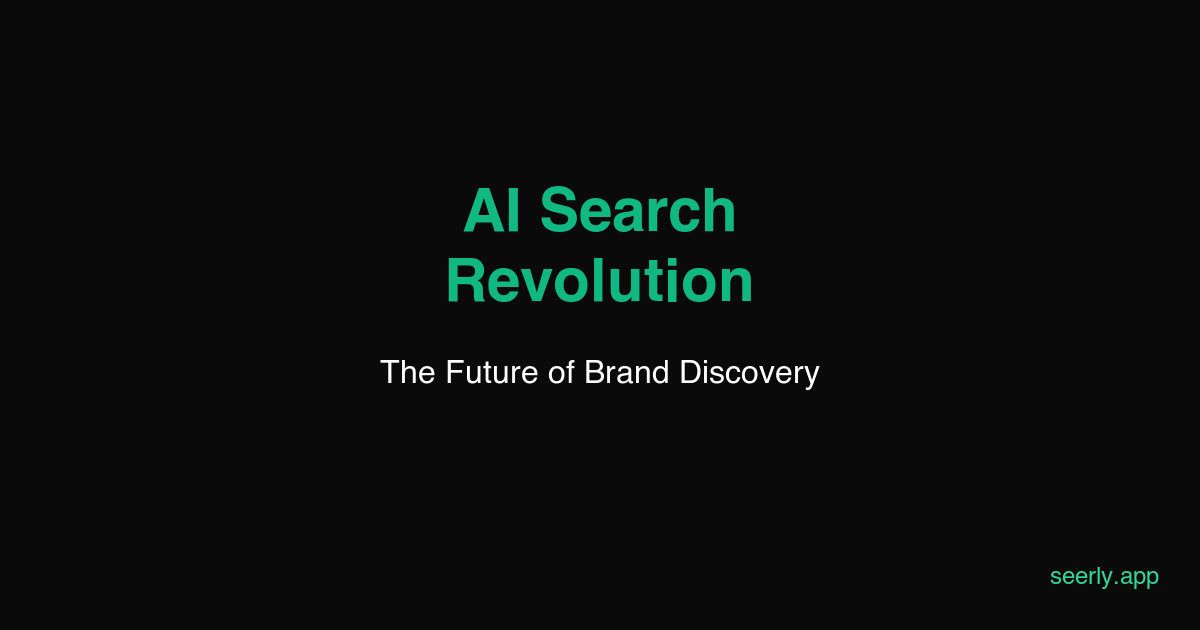The AI Search Revolution: How LLMs Are Changing Digital Discovery

Last week, I watched my teenage daughter ask ChatGPT for skincare recommendations instead of googling it. She didn't want ten blue links to click through. She wanted a conversation, an answer, a recommendation she could trust. And she got it in seconds.
This moment made me realize something profound: the way we've thought about search for the past 25 years is fundamentally changing. Google isn't going away, but it's no longer the only game in town. People are discovering information, products, and services through AI assistants in ways that completely bypass traditional search engines.
If you're a brand trying to be found online, this shift should keep you up at night. But it should also excite you, because we're witnessing the birth of an entirely new channel for reaching customers.
The Conversation Revolution
Think about how you search traditionally. You type in a few keywords, maybe refine them once or twice, scan the results, click on a few links, and piece together an answer from multiple sources. It works, but it's not exactly natural, is it?
Now compare that to asking Claude or ChatGPT a question. You speak naturally, like you're talking to a knowledgeable friend. "What's the best project management tool for a remote team of 15 people who are mostly engineers but have a few designers?" The AI doesn't just return links. It considers your specific context and gives you a thoughtful answer, often citing sources and explaining the reasoning.
The numbers tell the story. We're seeing over 40% of internet users now starting their research with AI chatbots instead of search engines, especially for high-consideration purchases. They're not using AI to replace search entirely, but they're definitely using it to shortcut the research process.
What makes this particularly interesting is that these users tend to be younger, more tech-savvy, and often have higher purchasing power. They're the early adopters, which means this behavior will only grow.
Why AI Search Feels Different
Traditional search engines were built on a simple premise: match keywords in queries to keywords in documents, rank by relevance and authority, and let users click through to find what they need. It's a mechanical process, albeit a sophisticated one.
AI search engines throw that model out the window. They understand context in a way that keyword matching never could. If you ask "What should I do about the battery in my phone dying so fast?", an AI doesn't just look for documents containing those words. It understands you have a problem with battery life, considers whether you mean an iPhone or Android, thinks about common causes and solutions, and synthesizes a helpful response.
The difference goes deeper than just understanding language. AI engines build on each turn of the conversation. You can ask a follow-up question like "What if I've already tried that?" and it remembers what you're talking about. This conversational memory creates a fundamentally different search experience, one that feels more like consulting an expert than querying a database.
Perhaps most importantly, AI engines provide direct answers with source attribution. Instead of making you visit five websites to piece together an answer, they synthesize the information and tell you where it came from. This is incredibly convenient for users, but it creates a new challenge for brands: you need to be cited by the AI, not just ranked by the algorithm.
The Visibility Imperative
Here's where things get interesting for brands. Being visible to AI engines isn't the same as being visible to Google. The optimization strategies that worked for traditional SEO don't necessarily translate.
Let me give you a concrete example. Imagine you sell a project management tool. Someone asks ChatGPT, "What are the best project management tools for startups?" If your tool isn't mentioned in that response, you've missed an opportunity. But if you are mentioned, especially if you're described as "particularly good for early-stage startups because of its simple interface and affordable pricing," you've just earned a powerful endorsement.
The kicker is that you can't bid your way into that recommendation. There's no "sponsored" slot in a ChatGPT response. The AI mentions you (or doesn't) based on what it knows about you from its training data and any real-time information it can access.
This creates a new imperative: you need to build digital presence in ways that make AI engines recognize you as authoritative in your space. Your website content, industry publications you're featured in, reviews from customers, and discussions about your brand on platforms the AI can access all contribute to whether and how you get recommended.
Building for AI Discovery
So how do you optimize for this new world? The answer is both simpler and more complex than traditional SEO.
It's simpler because the core principle is straightforward: create genuinely helpful, authoritative content that demonstrates real expertise. AI engines are trained to recognize quality, and they prefer sources that provide accurate, comprehensive information.
But it's more complex because you can't game the system with keywords and backlinks. You need to actually be good at what you do and communicate that expertise clearly.
Think about creating content that answers the questions your customers actually ask. Not keyword-stuffed blog posts, but thorough explorations of topics where you share real insights from your experience. When you explain not just what to do but why it matters and how you've seen it play out, you create the kind of content that AI engines love to cite.
Structure matters too, but not in the old SEO way. You're not optimizing for keyword density. You're making it easy for an AI to extract the key points from your content. Clear headings that actually describe what follows. Concise summaries of key takeaways. Direct statements that answer common questions.
Most importantly, showcase your credentials and real-world results. AI engines look for signals of expertise when deciding which sources to trust. Case studies, customer outcomes, industry recognition, and demonstrations of deep knowledge all help establish your authority.
The Measurement Challenge
Here's something that frustrates a lot of marketers: traditional analytics completely miss AI-driven discovery. When someone learns about your brand through a conversation with Claude and then searches for you directly or types your URL into their browser, that looks like direct traffic in Google Analytics. The AI interaction that drove awareness is invisible.
This creates a measurement problem. How do you know if your efforts to improve AI visibility are working if you can't track the impact?
The answer requires new approaches to measurement. You need to actively test how AI engines respond to queries in your domain. What do they say when someone asks about your product category? Do they mention you? How do they describe you compared to competitors?
This kind of testing can't be manual at scale. You need tools (like Seerly, naturally) that can systematically query AI engines, analyze the responses, and track changes over time. It's a new discipline, and we're still figuring out best practices, but it's absolutely necessary.
What Comes Next
The integration of AI into search is accelerating faster than most people realize. Google's Search Generative Experience is rolling out, turning traditional search results into AI-synthesized answers. Bing has GPT-4 built in. New AI-first search engines are launching regularly.
Within a year or two, most search experiences will have AI components. The distinction between "AI search" and "regular search" will blur. Every brand will need to think about AI visibility, not as a separate channel, but as a fundamental aspect of being discoverable online.
The brands that start now have a window of opportunity. AI training data gets updated periodically, and the sources that are already established as authoritative have an advantage. If you wait until everyone is competing for AI visibility, it'll be much harder to break through.
This doesn't mean abandoning traditional SEO. Google isn't going anywhere, and the fundamentals of creating quality content, building authority, and optimizing user experience still matter. But you need to expand your thinking beyond ranking algorithms to include how AI engines understand and recommend your brand.
The good news is that optimizing for AI visibility often improves your traditional SEO too. Creating comprehensive, authoritative content that demonstrates real expertise helps with both. The main difference is that AI requires you to actually be good, not just look good to an algorithm.
Where to Begin
If you're feeling overwhelmed, start small. Pick one area where you have genuine expertise and create a really comprehensive resource about it. Not a 500-word blog post, but a thorough guide that covers the topic from multiple angles, shares real insights from your experience, and genuinely helps people.
Then test how AI engines respond when asked about that topic. Do they cite your content? Do they mention your brand? This gives you a baseline and helps you understand what's working.
The future of digital discovery is conversational, contextual, and AI-mediated. The brands that embrace this shift and optimize for AI visibility alongside traditional search will thrive. Those that ignore it risk becoming invisible to a growing segment of potential customers.
The revolution is here. The question is whether you're ready to be part of it.


